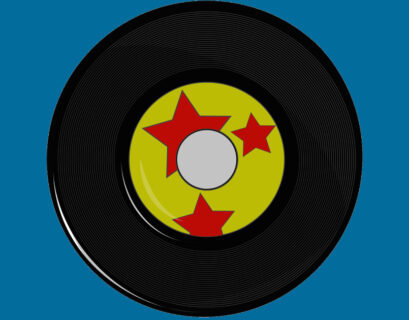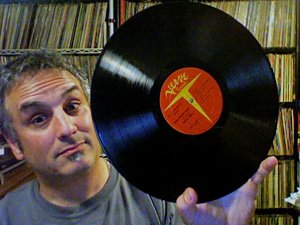It’s the time of year for saving money!
The release of a new album by Elvis Costello is a cause for celebration on many fronts. For me, as a fan since pretty much the beginning of his career I always get excited and try to dive in as soon as I can. For others who are perhaps a bit more narrowly focused when it comes to their fandom, I know that some have a wait and see approach these days to hear whether the album rocks before they will buy it.
If I might repurpose a phrase from Duke Ellington, it does rock… madly!
Called The Boy Named If, this new Elvis album is a joy, chockfull of instantly gratifying ear-worms and an urgent sense of hard-rocking purpose right from the opening riffs of “Farewell OK.”
Something of a concept album, from his official press release for the album Costello offers some clues as to what it is all about: ”The full title of this record is ‘The Boy Named If (And Other Children’s Stories).’ ‘IF,’ is a nickname for your imaginary friend; your secret self, the one who knows everything you deny, the one you blame for the shattered crockery and the hearts you break, even your own. You can hear more about this ‘Boy’ in a song of the same name.”
Lyrical continuity aside, one focus that jumped out at me listening to The Boy Named If is that it not only is a great rock ‘n’ roll record but in many ways it is a handy sampler of the many musical flavors Elvis has explored over the years. I’m just guessing, of course, but it seems that there are conscious references back to earlier works.
Some songs sound like they could fit on Get Happy and Trust. Others are more theatrical, akin to the storytelling pieces from 1989’s Spike collection. Heck there’s one song – – “The Difference” – – which if you read the lyrics separated from the music feels like it could be an old English murder ballad (albeit with a somewhat 21st-century twist). Yet the song is about as rock ‘n’ roll as you can get (imagine “Clubland”-esque chords mashed up with Imperial Bedroom style pop glory).
One of my favorite songs on the album so far is “Penelope Halfpenny” — pronounced “hay-penny” for all you non-Anglophiles reading this — a wonderful slice of British invasion-fueled driving power pop. Pete Thomas’ drums on this are especially tremendous in all their Keith Moon-meets-Motown glory.
The Boy Named If is one of Elvis’ strongest collections of pure rock ’n roll vibe in some time, perhaps since Momofuku (which perhaps not surprisingly was the last album he did backed entirely by his band The Imposters).
For those of you who yearn for the days of Elvis’ “original” band — The Attractions — it is perhaps time you stopped to smell the roses and realize that The Imposters are The Attractions in all but name (one member changed but everyone else is the same as in 1978). And they are sounding as great as ever, maybe even better than ever (if you’ll pardon my gushing exclamation points)!!
Again, Pete Thomas’ drums pack a powerful wallop on The Boy Named If. Steve Nieve’s keyboards are as inventive as ever. The most recent addition to the band –– if you can call 20-plus years in the group recent -– Davey Faragher is as powerful a player as Bruce Thomas ever was yet possibly more thoughtful in some ways. There are quite a number of showcases for each of The Imposters on this new album and the performances are exemplary.
As I’ve noted previously in past reviews, Elvis’ guitar playing has really come a long way since 1977 and he is now quite masterful at what he does. Some of his solos are absolutely ripping on The Boy Named If, yet always musically inventive. For a quick example, just listen about a minute and a half into the 3/4-time rock ’n roll waltz “What If I Can’t Give You Anything But Love?”
I decided to spring for the spiffy colored vinyl version of The Boy Named If — available only at independent record stores. I’m really quite pleased with it in all its (I’m assuming) 180-gram glory. The records are well centered and quiet which is all an audiophile can really hope for from vinyl pressings these days. Pressed opaque vinyl instead of translucent colors, it sounds just about as fine as a modern (likely digital) rock record is going to sound. In my experience (and which I’ve reported on before, a two part series, click here and here) the difference between that and a traditional black vinyl record are negligible. So kudos to whomever was watching the quality controls on manufacturing this release.
You can find The Boy Named If streaming on Qobuz (click here) and Tidal (click here), both in high resolution formats (you’ll need a good DAC to decode it, otherwise you’ll only hear it in CD quality which is still better than what that other popular platform — which shall remain nameless — puts out)
Kudos must also go out to co-producer Sebastian Krys who has successfully captured the essence of Elvis’ production styles across many periods of his career, yet somehow made it all feel integrated and whole. This is all the more amazing given that the four musicians were recording remotely in different studios, literally from France to California and probably other places betwixt and between.
To better appreciate this, imagine making a playlist of tracks from Imperial Bedroom, This Year’s Model, Spike, Get Happy and so many others from Elvis’ catalog. Of course the songs will be great but the sound will change dramatically given the studios recorded at and other production nuances. Yet, somehow because of the way this album was crafted and mixed, it feels like all classic Elvis and yet it it is simultaneously like none of them. Ultimately, The Boy Named If sounds like exactly how Elvis Costello should sound in 2022.
I have a feeling The Boy Named If is going to be one of my favorite albums of the year already. I can’t offer a much better complement than that. So, thank you Elvis for being there when we all needed you. This is just the dose of rock ‘n’ roll we needed to power through these strange days, indeed.























